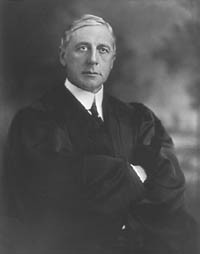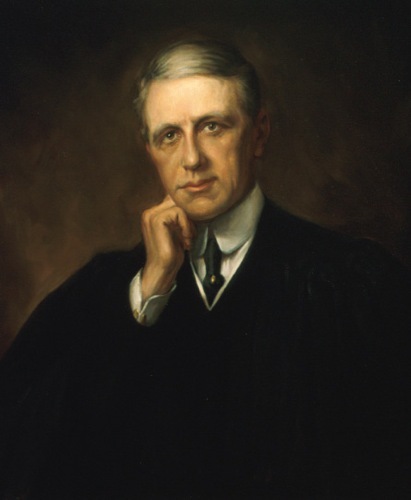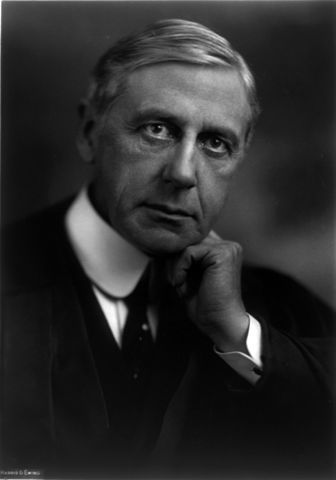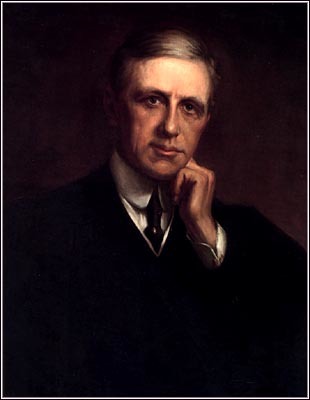The History Book Club discussion
SUPREME COURT OF THE U.S.
>
#65 - ASSOCIATE JUSTICE MAHLON PITNEY
date newest »
newest »
 newest »
newest »
 Mahlon Pitney (February 5, 1858 – December 9, 1924) was an American jurist and Republican Party politician from New Jersey, who served in the United States Congress and as an Associate Justice of the United States Supreme Court.
Mahlon Pitney (February 5, 1858 – December 9, 1924) was an American jurist and Republican Party politician from New Jersey, who served in the United States Congress and as an Associate Justice of the United States Supreme Court.Life and career
Pitney was born in Morristown, New Jersey, the son of Sarah Louise (née Halsted) and Henry Cooper Pitney. Pitney was a graduate of Princeton College. Pitney served two terms in Congress as a Representative from New Jersey from the 4th congressional district, and also served in the state senate and on the New Jersey Supreme Court. He was appointed to the U.S. Supreme Court by President William Howard Taft in 1912, and resigned in 1922 after suffering a stroke. He was one of only two Supreme Court Justices nominated by President Taft who also later served during Taft's tenure as Chief Justice of the Supreme Court. Pitney died in 1924 in Washington, D.C., and was interred at Evergreen Cemetery, in Morristown, New Jersey.
With his wife Florence Theodora Shelton, Pitney was the great-grandfather of actor Christopher Reeve.
When asked which twentieth-century Supreme Court justice "has done the most to protect the core Constitutional values," Richard Epstein cited Justice Pitney, calling him "a great justice" and "the only consistent near-libertarian on the Supreme Court."
Source: http://en.wikipedia.org/wiki/Mahlon_P...
 Mahlon Pitney
Mahlon PitneyBorn: 1858 Died: 1924
Occupation: Associate Justice, 1912–1922
From: Supreme Court Justices: A Biographical Dictionary.

Source: Supreme Court Justices: A Biographical Dictionary
 Historical Dictionary of the U.S. Supreme Court
Historical Dictionary of the U.S. Supreme Court by
by
 Artemus Ward, Christopher Brough (no photo), and Robert Arnold (no photo)
Artemus Ward, Christopher Brough (no photo), and Robert Arnold (no photo)Synopsis:
The US Supreme Court is an institution that operates almost totally behind closed doors. This book opens those doors by providing a comprehensive look at the justices, procedures, cases, and issues over the institution s more than 200-year history. The Court is a legal institution born from a highly politicized process. Modern justices time their departures to coincide with favorable administrations and the confirmation process has become a highly-charged political spectacle played out on television and in the national press.
Throughout its history, the Court has been at the center of the most important issues facing the nation: federalism, separation of powers, war, slavery, civil rights, and civil liberties. Through it all, the Court has generally, though not always, reflected the broad views of the American people as the justices decide the most vexing issues of the day. The Historical Dictionary of the U.S. Supreme Court covers its history through a chronology, an introductory essay, appendixes, and an extensive bibliography.
The dictionary section has over 700 cross-referenced entries on every justice, major case, issue, and process that comprises the Court s work. This book is an excellent access point for students, researchers, and anyone wanting to know more about the Supreme Court."
UPDATE SUPREME COURT - Justice Mahlon Pitney
Justice Mahlon Pitney (1858-1924)
By Guest Essayist RICHARD EPSTEIN April 28, 2017

The Collection of the Supreme Court of the United States (Artist: Adrian Lamb)
Mahlon Pitney was appointed to the United States Supreme Court by President William H. Taft in 1912, and served there for ten and one-half years until his retirement in December, 1922. He is generally regarded as a footnote in the annals of American Supreme Court justices. But for the ten years that he was on the Court, he was in my view a powerful intellect who often bested both Justices Holmes and Brandeis on the many occasions when their views clashed.
Why then his neglect? The answer: Supreme Court history is winner’s history and Pitney was on the wrong side of history, even if he was on the right side of the intellectual debate. The judicial heroes of the progressive era running roughly from 1900 to 1933 were justices like Brandeis and Holmes whose judicial philosophy and decisions prefigured the New Deal triumphs. Pitney in contrast was a systematic classical liberal who took great pains to defend strong property rights and limited government, on the correct ground that this approach would advance human liberty and human prosperity. State intervention should be regarded as an evil until it is shown to be a good.
Perhaps the most distinctive opinion that he wrote on this subject was his oft-reviled 1915 opinion Coppage v. Kansas, which held that it was unconstitutional infringement of liberty of contract under the Due Process Clause of the Fourteenth Amendment for Kansas to make it a criminal misdemeanor for an employer to insist that his employees not join a union so long as they continued to work for the employer. Pitney then doubled down on this position two years later in Hitchman Coal v. Mitchell, held that any union that sought to induce a worker to breach that contract of employment by joining, or even promising to join, a union while remaining on his job.
These two decisions provoked an enormous uproar at the time, including dissents by Holmes in Coppage and Brandeis in Hitchman Coal, on the ground that they were largely subversive of the rights of workers to engage in collective bargaining. The Holmes/Brandeis position slowly worked itself into law during the 1930s, with the passage of such pro-labor statutes as the Norris-LaGuardia Anti-Injunction Act of 1932, the National Labor Relations Act of 1935, and the Fair Labor Standards Act of 1938, all of which were unconstitutional under Pitney’s views.
So why is Pitney right, and Holmes and Brandeis wrong? The answer relates to the relationship between competition and monopoly. Pitney thought that competition had a preferred constitutional status relative to monopoly in all areas of economic life, a proposition that both Holmes and Brandeis denied. Pitney thus recognized that ordinary contracts for employment would produce gains from trade for both sides, and that the strongest protection for any worker lay in his ability to obtain alternative employment. Even the threat of quitting would impose market discipline on employers, which it did, so that real wages rose during the period, even if mutually advantageous contracts could, and often did produce greater disparities in wealth between the employer and employee. But those increased differentials were a byproduct of successful exchanges, so that it is no accident indeed that the so-called Lochner era between 1870 and 1940 represents, as Robert Gordon demonstrates in his book The Rise and Fall of American Growth, the greatest period of economic growth in American history—without properly acknowledging the legal framework that helped make that innovation possible.
Read the remainder of the article at: http://www.constitutingamerica.org/bl...
Other:
Link to podcast about Justice Pitney by Richard Epstein - Constituting America: http://www.constitutingamerica.org/bl...
 by Robert J. Gordon (no photo)
by Robert J. Gordon (no photo)
Source(s): Constituting America, Oyez
Justice Mahlon Pitney (1858-1924)
By Guest Essayist RICHARD EPSTEIN April 28, 2017

The Collection of the Supreme Court of the United States (Artist: Adrian Lamb)
Mahlon Pitney was appointed to the United States Supreme Court by President William H. Taft in 1912, and served there for ten and one-half years until his retirement in December, 1922. He is generally regarded as a footnote in the annals of American Supreme Court justices. But for the ten years that he was on the Court, he was in my view a powerful intellect who often bested both Justices Holmes and Brandeis on the many occasions when their views clashed.
Why then his neglect? The answer: Supreme Court history is winner’s history and Pitney was on the wrong side of history, even if he was on the right side of the intellectual debate. The judicial heroes of the progressive era running roughly from 1900 to 1933 were justices like Brandeis and Holmes whose judicial philosophy and decisions prefigured the New Deal triumphs. Pitney in contrast was a systematic classical liberal who took great pains to defend strong property rights and limited government, on the correct ground that this approach would advance human liberty and human prosperity. State intervention should be regarded as an evil until it is shown to be a good.
Perhaps the most distinctive opinion that he wrote on this subject was his oft-reviled 1915 opinion Coppage v. Kansas, which held that it was unconstitutional infringement of liberty of contract under the Due Process Clause of the Fourteenth Amendment for Kansas to make it a criminal misdemeanor for an employer to insist that his employees not join a union so long as they continued to work for the employer. Pitney then doubled down on this position two years later in Hitchman Coal v. Mitchell, held that any union that sought to induce a worker to breach that contract of employment by joining, or even promising to join, a union while remaining on his job.
These two decisions provoked an enormous uproar at the time, including dissents by Holmes in Coppage and Brandeis in Hitchman Coal, on the ground that they were largely subversive of the rights of workers to engage in collective bargaining. The Holmes/Brandeis position slowly worked itself into law during the 1930s, with the passage of such pro-labor statutes as the Norris-LaGuardia Anti-Injunction Act of 1932, the National Labor Relations Act of 1935, and the Fair Labor Standards Act of 1938, all of which were unconstitutional under Pitney’s views.
So why is Pitney right, and Holmes and Brandeis wrong? The answer relates to the relationship between competition and monopoly. Pitney thought that competition had a preferred constitutional status relative to monopoly in all areas of economic life, a proposition that both Holmes and Brandeis denied. Pitney thus recognized that ordinary contracts for employment would produce gains from trade for both sides, and that the strongest protection for any worker lay in his ability to obtain alternative employment. Even the threat of quitting would impose market discipline on employers, which it did, so that real wages rose during the period, even if mutually advantageous contracts could, and often did produce greater disparities in wealth between the employer and employee. But those increased differentials were a byproduct of successful exchanges, so that it is no accident indeed that the so-called Lochner era between 1870 and 1940 represents, as Robert Gordon demonstrates in his book The Rise and Fall of American Growth, the greatest period of economic growth in American history—without properly acknowledging the legal framework that helped make that innovation possible.
Read the remainder of the article at: http://www.constitutingamerica.org/bl...
Other:
Link to podcast about Justice Pitney by Richard Epstein - Constituting America: http://www.constitutingamerica.org/bl...
 by Robert J. Gordon (no photo)
by Robert J. Gordon (no photo)Source(s): Constituting America, Oyez
Justice of the Day - Mahlon Pitney
By JLGARZON1 February 5, 2015

Justice Mahlon Pitney (By Harris & Ewing)
Today’s Justice of the Day is: MAHLON PITNEY. Justice Pitney was born on this day, February 5, in 1858.
Justice Pitney was born in Morristown, New Jersey, the state from which he would be appointed to the Supreme Court of the United States. He graduated with an A.B. from the College of New Jersey (today called Princeton University) in 1879.
Justice Pitney worked in private practice early in career, first in Dover, New Jersey (from 1882 to 1889) and then in his home town of Morristown (from 1889 to 1894). He took office as a Member of the United States House of Representatives (he was elected as a Republican) the year after he ceased working as a private attorney, remaining there until 1899, one year after he began a three-year term as a State Senator in New Jersey. Justice Pitney joined the Supreme Court of New Jersey in 1901, where he would remain until his appointment to the SCUS; he was Chancellor of that court for the last four years of his tenure there.
Justice Pitney was nominated by President William Howard Taft (with whom he would later serve) on February 19, 1912, to a seat vacated by Justice John Marshall Harlan (I). He was confirmed by the United States Senate on March 13, and received his commission that day. He took the Judicial Oath to officially join the SCUS on March 18, and he served on the White and Taft Courts. His service was terminated on December 31, 1922, due to his resignation.
Justice Pitney is not especially well-remembered today and did not have a particularly strong impact on the SCUS’s direction or jurisprudence. Chief Justice Taft, the man who had appointed him to the SCUS, supposedly even once criticized him as a weak Justice some time during the brief overlap of their tenures.
Other:
 by Lewis L. Gould (no photo)
by Lewis L. Gould (no photo)
Source: The Daily Kos
By JLGARZON1 February 5, 2015

Justice Mahlon Pitney (By Harris & Ewing)
Today’s Justice of the Day is: MAHLON PITNEY. Justice Pitney was born on this day, February 5, in 1858.
Justice Pitney was born in Morristown, New Jersey, the state from which he would be appointed to the Supreme Court of the United States. He graduated with an A.B. from the College of New Jersey (today called Princeton University) in 1879.
Justice Pitney worked in private practice early in career, first in Dover, New Jersey (from 1882 to 1889) and then in his home town of Morristown (from 1889 to 1894). He took office as a Member of the United States House of Representatives (he was elected as a Republican) the year after he ceased working as a private attorney, remaining there until 1899, one year after he began a three-year term as a State Senator in New Jersey. Justice Pitney joined the Supreme Court of New Jersey in 1901, where he would remain until his appointment to the SCUS; he was Chancellor of that court for the last four years of his tenure there.
Justice Pitney was nominated by President William Howard Taft (with whom he would later serve) on February 19, 1912, to a seat vacated by Justice John Marshall Harlan (I). He was confirmed by the United States Senate on March 13, and received his commission that day. He took the Judicial Oath to officially join the SCUS on March 18, and he served on the White and Taft Courts. His service was terminated on December 31, 1922, due to his resignation.
Justice Pitney is not especially well-remembered today and did not have a particularly strong impact on the SCUS’s direction or jurisprudence. Chief Justice Taft, the man who had appointed him to the SCUS, supposedly even once criticized him as a weak Justice some time during the brief overlap of their tenures.
Other:
 by Lewis L. Gould (no photo)
by Lewis L. Gould (no photo)Source: The Daily Kos
JUSTICE MAHLON PITNEY (1858-1924)

Justice Mahlon Pitney (By Harris & Ewing)
Link to audiotaped biography: https://youtu.be/48Rm6KS0Ovo
Other:
 by Melissa Maupin (no photo)
by Melissa Maupin (no photo)
Source: You Tube, Wikipedia

Justice Mahlon Pitney (By Harris & Ewing)
Link to audiotaped biography: https://youtu.be/48Rm6KS0Ovo
Other:
 by Melissa Maupin (no photo)
by Melissa Maupin (no photo)Source: You Tube, Wikipedia
Mahlon Pitney, 1912-1922

MAHLON PITNEY was born on February 5, 1858, in Morristown, New Jersey. He was graduated from Princeton University in 1879 and earned a graduate degree three years later. Pitney studied law with his father and was admitted to the bar in 1882. Pitney practiced law for seven years in Dover, New Jersey. When his father was appointed Vice Chancellor of New Jersey in 1889, Pitney returned to Morristown and took over the elder Pitney's practice. Pitney was elected to the United States House of Representatives in 1894 and was re-elected in 1896. He resigned before the end of his second term when he was elected to the New Jersey State Senate. He was elected President of the Senate the following year. Pitney was appointed to the New Jersey Supreme Court for a seven-year term in 1901. In 1908, he was appointed Chancellor, head of both law and equity branches of the Court. On March 13, 1912, President William H. Taft nominated Pitney to the Supreme Court of the United States. The Senate confirmed the appointment on March 18, 1912. Pitney retired from the Supreme Court on December 31, 1922, after ten years of service. He died on December 9, 1924, at the age of sixty-six.
Link to article: https://supremecourthistory.org/timel...
More:
 by Lewis L. Gould (no photo)
by Lewis L. Gould (no photo)
Source: The Supreme Court Historical Society

MAHLON PITNEY was born on February 5, 1858, in Morristown, New Jersey. He was graduated from Princeton University in 1879 and earned a graduate degree three years later. Pitney studied law with his father and was admitted to the bar in 1882. Pitney practiced law for seven years in Dover, New Jersey. When his father was appointed Vice Chancellor of New Jersey in 1889, Pitney returned to Morristown and took over the elder Pitney's practice. Pitney was elected to the United States House of Representatives in 1894 and was re-elected in 1896. He resigned before the end of his second term when he was elected to the New Jersey State Senate. He was elected President of the Senate the following year. Pitney was appointed to the New Jersey Supreme Court for a seven-year term in 1901. In 1908, he was appointed Chancellor, head of both law and equity branches of the Court. On March 13, 1912, President William H. Taft nominated Pitney to the Supreme Court of the United States. The Senate confirmed the appointment on March 18, 1912. Pitney retired from the Supreme Court on December 31, 1922, after ten years of service. He died on December 9, 1924, at the age of sixty-six.
Link to article: https://supremecourthistory.org/timel...
More:
 by Lewis L. Gould (no photo)
by Lewis L. Gould (no photo)Source: The Supreme Court Historical Society
Books mentioned in this topic
The William Howard Taft Presidency (other topics)William Howard Taft: Our Twenty-Seventh President (other topics)
The William Howard Taft Presidency (other topics)
The Rise and Fall of American Growth: The U.S. Standard of Living since the Civil War (other topics)
Historical Dictionary of the U.S. Supreme Court (other topics)
Authors mentioned in this topic
Lewis L. Gould (other topics)Melissa Maupin (other topics)
Lewis L. Gould (other topics)
Robert J. Gordon (other topics)
Artemus Ward (other topics)
More...





Biography
A classmate of Woodrow Wilson at Princeton, Mahlon Pitney served in Republican political office in Congress and in New Jersey. Though he aspired to be governor, he was appointed to the state's highest court ending his electoral ambitions. He served on that court for 20 years, eventually to become its chancellor. He was the last of President William Howard Taft's appointments to the Court. Taft himself was later appointed chief justice of the Supreme Court on which Pitney still served and criticized him as a weak member.
Personal Information
Born Friday, February 5, 1858
Died Tuesday, December 9, 1924
Childhood Location New Jersey
Childhood Surroundings New Jersey
Position Associate Justice
Seat 9
Nominated By Taft
Commissioned on Wednesday, March 13, 1912
Sworn In Monday, March 18, 1912
Left Office Sunday, December 31, 1922
Reason For Leaving Disabled
Length of Service 10 years, 9 months, 13 days
Home New Jersey
Source: http://www.oyez.org/justices/mahlon_p...